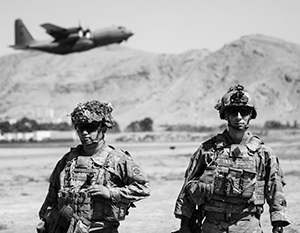
Have the Taliban Really Changed?
(South Korea) on 3 September 2021
by Eui-gil Jeong (link to original)
The Taliban first went to the U.N. compound to find and execute Mohammad Najibullah, leader of the communist regime that had collapsed five years ago. Beaten to death by stones, clubs and the like, the bodies of Najibullah and his younger brother were publicly displayed hanging from gallows at a roundabout in the city center. The slogan, “Throw reason to the dogs,” was posted on the building of the religious police the Taliban soon established. Broadcasting music was banned under Islamic law, and even using toothpaste was considered taboo as the Islamic Prophet Muhammad had used plant roots to brush his teeth. In an instant, women — who had comprised 40% of doctors, 50% of civil servants and 70% of teachers — became not only jobless, but also paupers.
Twenty-five years later, the Taliban again entered Kabul on Aug. 15 without any bloodshed. Kabul has become a modernized metropolis with a population that has increased nearly tenfold to 4.5 million, and some Taliban members are not even wearing traditional clothing. The first person the Taliban leadership sought out was former president Hamid Karzai. The Taliban leadership met face-to-face with Karzai, who led the U.S. military in the armed struggle against their regime 20 years ago, and discussed the transfer of power and the formation of a new government. The Taliban promote propaganda through social media, declaring amnesty and reconciliation. On Sept. 1, the international media organization Reporters Without Borders said that only about 100 out of 700 women journalists are currently working and urged all women journalists to return to work.
Have the Taliban truly changed, or have they only changed their outward appearance? The one thing that is certain is that the Taliban today are not in the same situation as they were 25 years ago. The Taliban of 25 years ago were nothing more than a target of hatred that merely piqued the international community’s curiosity. The international community’s indifference to Afghanistan had not fundamentally changed after the Taliban seized power.
Now, the Taliban are a subject of extreme interest to the international community, including the United States, China and Russia. The United States needs the cooperation of the Taliban to prevent Afghanistan from becoming a terrorist base again. The United States ultimately needs the Taliban’s Afghanistan for its confrontation with China, which was one of its reasons for withdrawing from Afghanistan. China needs to change the power vacuum in Central Asia, centered on an Afghanistan from which the U.S. has exited, into a power balance in its favor. Through this, China could extend its sphere of influence to the Indian Ocean as a way to neutralize the United States’ Indo-Pacific strategy designed to contain it.
Unlike in the past, the Taliban are certain to try to become a regime recognized by the international community. This is because maintaining a regime is impossible without the recognition of the international community. The Taliban urgently need the $9 billion of central bank assets frozen by the U.S., and Afghan residents who have depended on Western aid and tasted Western goods over the past 20 years cannot be governed by Islamic law alone.
The U.S. Treasury Department has decided to allow resuming personal remittances to Afghanistan starting on Sept. 2, a practice which was banned after the Taliban advanced into Kabul. Remittances from overseas, which account for 4% of Afghanistan's gross domestic product, are vital to Afghanistan’s working-class economy.
The question of whether the Taliban have truly changed is meaningless. The situations 25 years ago and now are different, and this difference is sure to make the Taliban and the international community respond differently.


